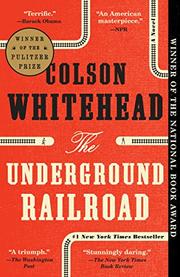


THE UNDERGROUND RAILROAD
by Colson Whitehead
What if the metaphorical Underground Railroad had been an actual…underground railroad, complete with steam locomotive pulling a “dilapidated box car” along a subterranean nexus of steel tracks?
For roughly its first 60 pages, this novel behaves like a prelude to a slave narrative which is, at once, more jolting and sepulchral than the classic firsthand accounts of William Wells Brown and Solomon Northup. Its protagonist, Cora, is among several African-American men and women enslaved on a Georgia plantation and facing a spectrum of savage indignities to their bodies and souls. A way out materializes in the form of an educated slave named Caesar, who tells her about an underground railroad that can deliver her and others northward to freedom. So far, so familiar. But Whitehead, whose eclectic body of work encompasses novels (Zone One, 2011, etc.) playing fast and loose with “real life,” both past and present, fires his most daring change-up yet by giving the underground railroad physical form. This train conveys Cora, Caesar, and other escapees first to a South Carolina also historically unrecognizable with its skyscrapers and its seemingly, if microscopically, more liberal attitude toward black people. Compared with Georgia, though, the place seems so much easier that Cora and Caesar are tempted to remain, until more sinister plans for the ex-slaves’ destiny reveal themselves. So it’s back on the train and on to several more stops: in North Carolina, where they’ve not only abolished slavery, but are intent on abolishing black people, too; through a barren, more forbidding Tennessee; on to a (seemingly) more hospitable Indiana, and restlessly onward. With each stop, a slave catcher named Ridgeway, dispensing long-winded rationales for his wicked calling, doggedly pursues Cora and her diminishing company of refugees. And with every change of venue, Cora discovers anew that “freedom was a thing that shifted as you looked at it, the way a forest is dense with trees up close but from outside, the empty meadow, you see its true limits.” Imagine a runaway slave novel written with Joseph Heller’s deadpan voice leasing both Frederick Douglass’ grim realities and H.P. Lovecraft’s rococo fantasies…and that’s when you begin to understand how startlingly original this book is.
Whitehead continues the African-American artists' inquiry into race mythology and history with rousing audacity and razor-sharp ingenuity; he is now assuredly a writer of the first rank.